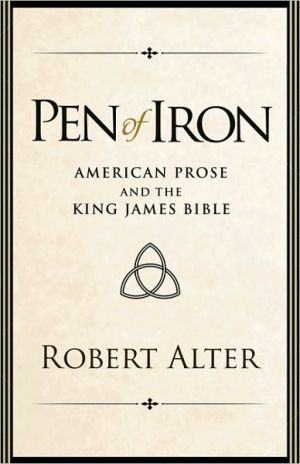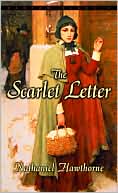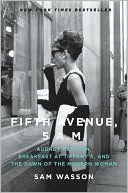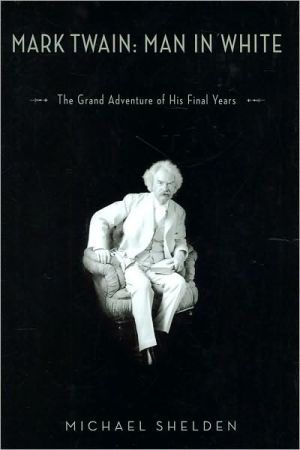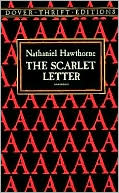Pen of Iron: American Prose and the King James Bible
The simple yet grand language of the King James Bible has pervaded American culture from the beginning—and its powerful eloquence continues to be felt even today. In this book, acclaimed biblical translator and literary critic Robert Alter traces some of the fascinating ways that American novelists—from Melville, Hemingway, and Faulkner to Bellow, Marilynne Robinson, and Cormac McCarthy—have drawn on the rich stylistic resources of the canonical English Bible to fashion their own strongly...
Search in google:
"Alter's remarkable book breathes new life into a long-neglected topic, the study of style. With the finesse that is his trademark, Alter shows the importance of all that is lost in translation. As it delineates the surprising ways in which the King James Bible has shaped American prose, Pen of Iron redirects current literary criticism and theory."--Gary Saul Morson, author of "Anna Karenina" in Our Time"In this subtle and impressive work, Robert Alter shows us in great, attentive detail what style is, demonstrating the work of language on every page and revealing the extraordinary things that American writers have done with the language of the King James Bible."--Michael Wood, author of Literature and the Taste of Knowledge"This is a deft, spare, and deeply learned appraisal of the animating and abiding presence of the King James Bible in the language of the American novel, from the nineteenth century to today. If, as Robert Alter says, 'style is ultimately a mode of thinking,' Alter's own style shows a mode of thought that at once discerns, explicates, and registers in compressed, elegant formulations what is most distinctive about the works he examines."--Tracy Fessenden, author of Culture and Redemption: Religion, the Secular, and American LiteraturePublishers WeeklyAmong the many English translations of the Bible, a single one is responsible for the shape of some of the most iconic works of American literature, argues Alter, a comparative literature professor at University of California, Berkeley. Focusing not on the application of specific content but rather on the more elusive matter of style, Alter, author of more than 20 books, shows how the King James Version (especially its Old Testament) informed the work of Melville, Faulkner, Hemingway, Bellow, Marilynne Robinson, and Cormac McCarthy. Alter's knowledge of Hebrew and its translation in the KJV combined with his sensitivity to the sound and form of the distinctly American Moby-Dick, Absalom, Absalom! and The Road, among others, yield rich insights. By his own admission, Alter may be accused of occasionally overreaching associations. However, even if readers are unconvinced by some of the author's claims, they will find in this book a compelling case for style. Alter masterfully demonstrates how style itself affects and even conveys the meaning and power of great literature. (Apr.)
Prelude America as a scriptural culture 1Ch. 1 Style in America and the King James version 9Ch. 2 Moby-Dick : polyphony 42Ch. 3 Absalom, Absalom! : lexicon 78Ch. 4 Seize the day : American amalgam 114Ch. 5 The world through parataxis 146Index 185
\ New York Review of BooksIn Pen of Iron, the eminent Bible scholar and translator Robert Alter recounts a small yet telling part of the story of American literature's attunement to the King James Bible. Exploring the way the KJB has impacted both the prose and worldviews of select American authors—mainly Lincoln, Melville, Faulkner, Hemingway, Bellow, and Cormac McCarthy—Alter shows that, even when they parody it or contend with its legacies (as Melville and Faulkner did), the King James Bible remains an enduring point of reference, if not a moral center of gravity, in their work.\ — Robert Pogue Harris\ \ \ \ \ Christian CenturyThis well-written, thought-provoking book doesn't take too long to read.\ \ \ Anglican And Episcopal HistoryPen of Iron, which reads like a collection of essays, expands our understanding of how the King James Version of the Old Testament has influenced American fiction. Even more, Alter demonstrates the power the style of the translation had on the work of many of our most important writers.\ — Nancy Coffey Hefferman\ \ \ \ \ Journal of Church and StateRobert Alter is one of our most astute readers of both sacred and secular texts.\ — Ralph C. Wood\ \ \ \ \ New RepublicAs a leading scholar and translator of the Bible, who is also deeply knowledgeably about American literature, Robert Alter is ideally suited to study this complicated inheritance. . . . Pen of Iron makes a convincing case that it is impossible to fully appreciate American literature without knowing the King James Bible—indeed, without knowing it almost instinctively, the way generations of Americans used to know it.\ \ \ \ \ New York Review of BooksIn Pen of Iron, the eminent Bible scholar and translator Robert Alter recounts a small yet telling part of the story of American literature's attunement to the King James Bible. Exploring the way the KJB has impacted both the prose and worldviews of select American authors—mainly Lincoln, Melville, Faulkner, Hemingway, Bellow, and Cormac McCarthy—Alter shows that, even when they parody it or contend with its legacies (as Melville and Faulkner did), the King James Bible remains an enduring point of reference, if not a moral center of gravity, in their work.\ \ \ \ \ Books & CultureAlter's short book spins off enough sparkling asides to inspire a shelf of very long volumes. . . . [T]he result is a treasure of insight and a welcome stimulus to Christian reflection.\ \ \ \ \ Religion and Ethics NewsweeklyAlter's book is tightly focused and sweeping in the specificity of its claims. He takes a commonplace of conventional wisdom—the ubiquity the Bible once had in American elite culture—to argue that the King James translation created 'the foundational language and symbolic imagery' of the whole of American culture, especially its prose fiction.\ \ \ \ \ Jewish JournalPen of Iron is a work of lofty literary scholarship, and Alter is addressing a readership that already speaks his language and is ready to receive his wisdom. Indeed, the book is based on a series of lectures that Alter delivered at Princeton University in 2008. But it is also true to say that he is not unlike a biblical prophet, speaking truth to the power of the popular culture and exhorting us to be better and more discerning reader.\ \ \ \ \ New CriterionAlter's intelligent treatments of several major works—principally Moby-Dick, Absalom, Absalom!, Seize the Day, and Marilynne Robinson's justly applauded novel Gilead (2004)—does more than simply explain allusions to biblical texts. He is interested in the ways in which American writers incorporate the stylistic traits of the King James Version for their own purposes, even when they are not themselves rooted in a Christian or biblical world view.\ \ \ \ \ Anglican And Episcopal HistoryPen of Iron, which reads like a collection of essays, expands our understanding of how the King James Version of the Old Testament has influenced American fiction. Even more, Alter demonstrates the power the style of the translation had on the work of many of our most important writers.\ \ \ \ \ Journal of Church and StateRobert Alter is one of our most astute readers of both sacred and secular texts.\ \ \ \ \ Jewish JournalPen of Iron is a work of lofty literary scholarship, and Alter is addressing a readership that already speaks his language and is ready to receive his wisdom. Indeed, the book is based on a series of lectures that Alter delivered at Princeton University in 2008. But it is also true to say that he is not unlike a biblical prophet, speaking truth to the power of the popular culture and exhorting us to be better and more discerning reader.\ — Jonathan Kirsch\ \ \ \ \ New RepublicAs a leading scholar and translator of the Bible, who is also deeply knowledgeably about American literature, Robert Alter is ideally suited to study this complicated inheritance. . . . Pen of Iron makes a convincing case that it is impossible to fully appreciate American literature without knowing the King James Bible—indeed, without knowing it almost instinctively, the way generations of Americans used to know it.\ — Adam Kirsch\ \ \ \ \ Books & CultureAlter's short book spins off enough sparkling asides to inspire a shelf of very long volumes. . . . [T]he result is a treasure of insight and a welcome stimulus to Christian reflection.\ — Mark Noll\ \ \ \ \ Religion and Ethics NewsweeklyAlter's book is tightly focused and sweeping in the specificity of its claims. He takes a commonplace of conventional wisdom—the ubiquity the Bible once had in American elite culture—to argue that the King James translation created 'the foundational language and symbolic imagery' of the whole of American culture, especially its prose fiction.\ — David E. Anderson\ \ \ \ \ New CriterionAlter's intelligent treatments of several major works—principally Moby-Dick, Absalom, Absalom!, Seize the Day, and Marilynne Robinson's justly applauded novel Gilead (2004)—does more than simply explain allusions to biblical texts. He is interested in the ways in which American writers incorporate the stylistic traits of the King James Version for their own purposes, even when they are not themselves rooted in a Christian or biblical world view.\ — Barton Swaim\ \ \ \ \ Publishers WeeklyAmong the many English translations of the Bible, a single one is responsible for the shape of some of the most iconic works of American literature, argues Alter, a comparative literature professor at University of California, Berkeley. Focusing not on the application of specific content but rather on the more elusive matter of style, Alter, author of more than 20 books, shows how the King James Version (especially its Old Testament) informed the work of Melville, Faulkner, Hemingway, Bellow, Marilynne Robinson, and Cormac McCarthy. Alter's knowledge of Hebrew and its translation in the KJV combined with his sensitivity to the sound and form of the distinctly American Moby-Dick, Absalom, Absalom! and The Road, among others, yield rich insights. By his own admission, Alter may be accused of occasionally overreaching associations. However, even if readers are unconvinced by some of the author's claims, they will find in this book a compelling case for style. Alter masterfully demonstrates how style itself affects and even conveys the meaning and power of great literature. (Apr.)\ \
